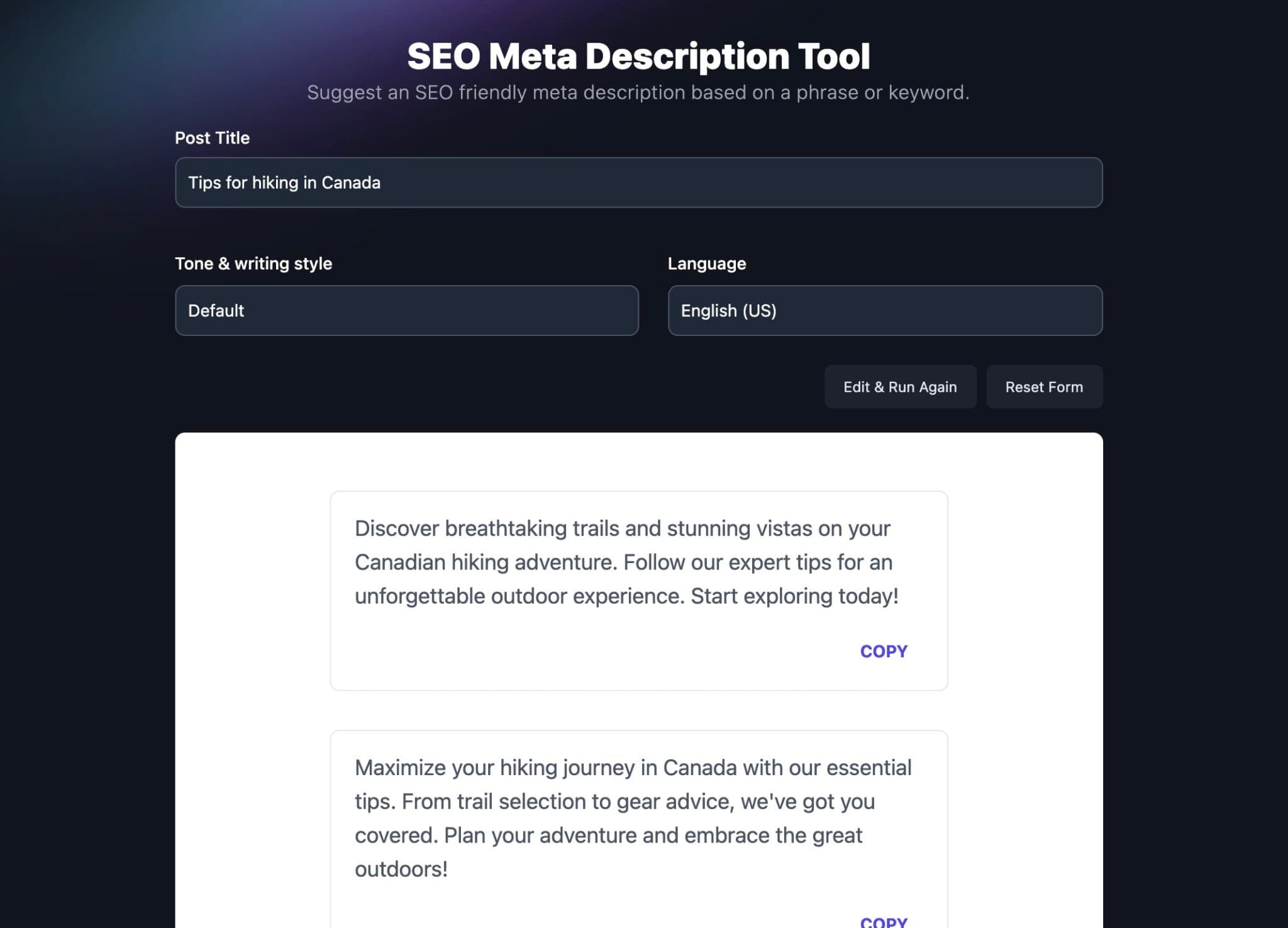
A meta description is an essential element of on-page SEO that summarizes a webpage’s content and helps persuade users to click on your website in search results.
In this article, we will explore the characteristics of a good meta description and how to optimize it to improve your SEO rankings.
Key Takeaways
- A meta description is a short text that summarizes a webpage for search results.
- Clear, relevant, and unique meta descriptions can increase click-through rates.
- Keep each meta description under 155 characters and include your main keyword.
- Use an active voice, make descriptions actionable, and match the page content.
- Tools like RightBlogger can help generate effective meta descriptions.
What is a Meta Description?
A meta description is a brief snippet of text displayed below the title of a webpage in search engine result pages (like Google). Its purpose is to provide a concise overview of what the page offers to potential visitors. While search engines don’t directly use meta descriptions as a ranking factor, they indirectly influence click-through rates, which can impact your SEO efforts massively. To view a page’s meta description you can use the RightBlogger Chrome Extension or an online tool like Meta Preview Tool.
Characteristics of a Good Meta Description
To write an effective meta description, consider the following characteristics:
1. Keep it concise
Limit your meta description to around 155 characters. By keeping it brief, you can capture users’ attention without overwhelming them with excessive information. Additionally search engines commonly cut off your
2. Use an active voice and be actionable
Craft your meta description in an active voice to make it more engaging and actionable. Encourage users to take a specific action, such as “Learn how to write compelling meta descriptions” or “Discover the secrets to effective SEO strategies.”
3. Include a call to action
Incorporate a compelling call to action in your meta description to entice users to click on your link. For example, you can use phrases like “Read now,” “Discover more,” or “Find out how.”
4. Utilize your focus keyphrase
Integrate your primary keyword naturally into the meta description. Doing so can increase the visibility of your webpage for relevant search queries and improve the chances of attracting the right audience. New to keyword research? read this guide to keyword research.
5. Show specifications when necessary
If your webpage offers specific information or features, highlight them in the meta description. This helps users understand the unique value your page provides and encourages them to click through for more details.
6. Ensure relevance to the page’s content
Make sure your meta description accurately reflects the content of the webpage. Misleading or unrelated descriptions may lead to high bounce rates and negatively impact your SEO efforts.
7. Make it unique
Craft a unique meta description for each webpage on your website. This helps search engines understand the distinct content of each page and improves the chances of attracting relevant traffic.
Generating a Meta Description with RightBlogger
Of course with the explosion of AI written content online it’s easier than ever to generate a meta description with AI. RightBlogger has a meta description generator to instantly write a meta description. Using this tool only requires you to enter a topic or post title for it to generate a few meta descriptions to choose from.

Like all RightBlogger tools it allows you to copy the content to your CMS like WordPress.
Common Questions About Meta Descriptions
What’s the best length for a meta description?
Aim for fewer than 155 characters so your description shows up fully in search results.
Can I use the same meta description for different pages?
No. You should write a unique meta description for every page to boost both search relevance and user experience.
Do meta descriptions affect search rankings?
Not directly. However, a clear and interesting meta description can improve your click-through rate, which may help your page over time.
Should I always add a keyword to my meta description?
Yes. Use your main keyword naturally to attract users who are searching for that topic.
Are meta description tools able to generate unique content?
Yes. Tools like RightBlogger create fresh, unique meta descriptions for each page or topic, saving time and reducing duplicate content.
Conclusion
Optimizing your meta descriptions can significantly impact your website’s visibility in search results and drive more organic traffic to your pages. By following the characteristics outlined in this article, you can create compelling and persuasive meta descriptions that entice users to click on your links.
Remember, a well-crafted meta description should be concise, engaging, action-oriented, and relevant to the page’s content.
Take the time to write unique meta descriptions for each webpage, incorporating your focus keyphrase when appropriate. Also think about the meta description in context of the meta title as they are closely related.
With these tips, you can improve your chances of ranking higher in search engine results and attracting more visitors to your website.
What should I include in a meta description to get more clicks?
A good meta description tells searchers what the page is about and gives them a reason to click.
Start with the main benefit or answer your page gives. Then add your main keyword in a natural way so it matches what people searched.
Use an active voice and a simple call to action like “Learn,” “Get,” or “Find out.” Make sure the promise in the description matches the page, or people may leave fast after clicking.
How long should my meta description be, and what if Google cuts it off?
Keep your meta description under about 155 characters so it is less likely to get cut off in search results.
Put the most important words first, like your keyword and the main benefit. If the end gets trimmed, readers still see the key message.
If your draft is too long, shorten it without losing meaning. You can use RightBlogger to quickly shorten meta text and keep it clear.
Why does Google sometimes rewrite my meta description, and can I prevent it?
Google may rewrite your meta description if it thinks another line from your page better matches the search.
You cannot fully control this, but you can reduce it by making your description very specific and closely aligned with the page. Avoid vague marketing lines that do not match the content.
Also, make each meta description unique for each page. Duplicate or generic descriptions make it easier for Google to choose something else.
How do I write unique meta descriptions for many pages without repeating myself?
Write each meta description around what is unique on that page, not just the topic.
Change the angle based on the page’s goal. One page can focus on steps, another on results, and another on tools or examples.
Add specific details when it helps, like who it is for, what is included, or a clear outcome. If you need help finding better keywords for each page, start with RightBlogger’s keyword research tool to match real searches.
How can RightBlogger help me generate and test meta descriptions faster?
RightBlogger can create strong meta description options in seconds, so you are not starting from a blank page.
Use the built-in meta description generator to get several versions, then pick the one that best matches your page and search intent.
After that, preview how it will look in Google with the SERP preview tool. It also helps to make sure your meta description matches your title, since they work together in search results.
Article by Andy Feliciotti
RightBlogger Co-Founder, Andy Feliciotti builds websites and shares photo and travel tips on YouTube and his blog.
New:Autoblogging + Scheduling
Automated SEO Blog Posts That Work
Try RightBlogger for free, we know you'll love it.
- Automated Content
- Blog Posts in One Click
- Unlimited Usage





Leave a comment
You must be logged in to comment.
Loading comments...